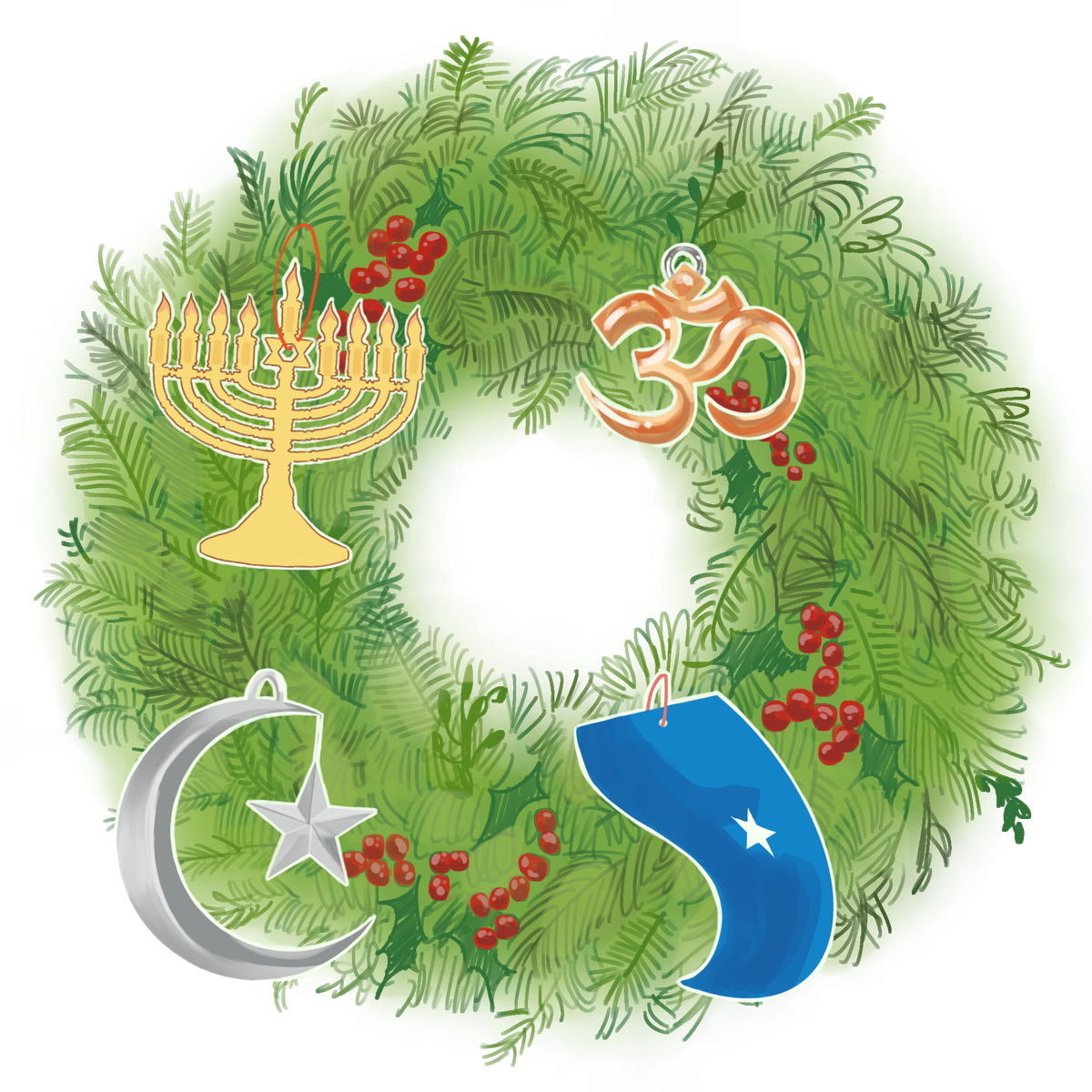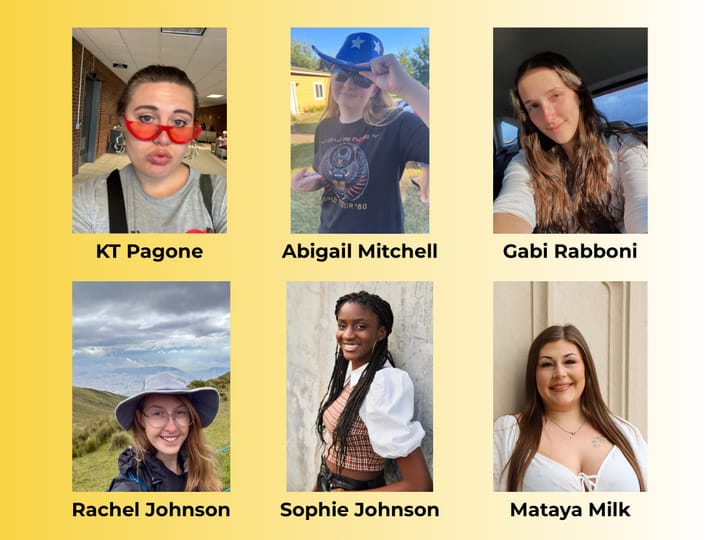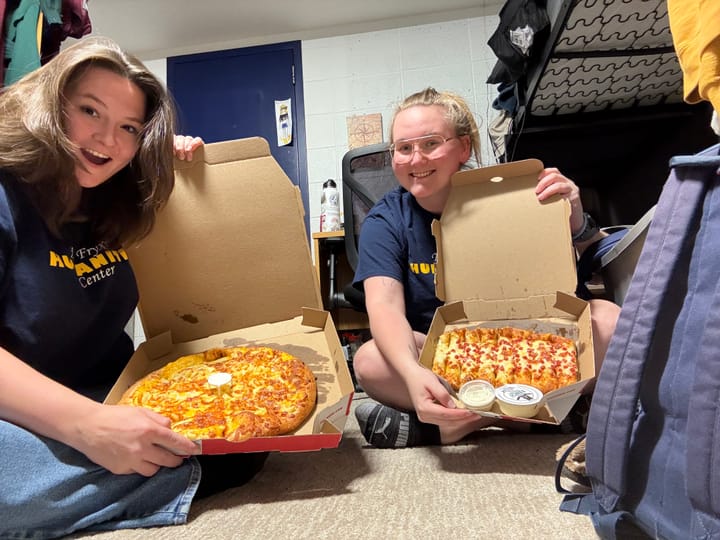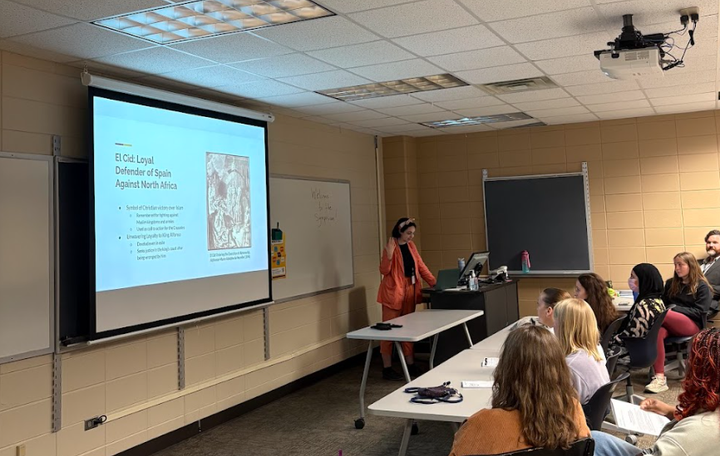Vikings celebrate holiday traditions

With the holiday season fast approaching, many students at Augustana, a Lutheran university, are gearing up to celebrate Christmas.
However, the university is home to students with a variety of different faith and cultural backgrounds, and many have special ways to celebrate holidays over winter break.
Sneha Acharya
Acharya is a junior biology major and a Hindu from Nepal.
What, if any holidays, do you celebrate around the fall and winter months?
We had two big major events or festivals that just went by. One is Tihar. Indian people say that as Diwali, but we call it Tihar, which is celebrated for five days with a lot of lights and colors. We worship dogs and cows, and we also worship our own brothers, and then we worship goddess Lakshmi, known as the goddess of wealth.
We had another big festival that went just before Diwali, known as Dashain. It is considered one of the biggest festivals of the Nepali community.
For Dashain, elder people apply Tika, which is made up of rice and a little bit of red color, and then some people also add yogurt and water and mix it and make it like a paste.
Then we apply it on our forehead, and we have something called a jamara that we apply at the top of our ears after we have applied the Tika. Elder people give some money to their younger children or relatives.
How have those celebrations changed from back home to living on campus?
It was very hard because my parents always used to make and apply my Tika and then they used to give me money, but I don’t have any of my family here, so all that I did was I just called some of my Nepali friends who were younger than me and then I just applied some Tika on their forehead and then gave jamara.
Do you celebrate any other holidays? Thanksgiving?
I didn’t know anything about Thanksgiving before I came here.
I am a very religious person, so I think on the day of Thanksgiving or the day before it there is something known as Ekadashi, which is again a day for fasting, avoiding any kind of grains because it is considered, at that day, the moon is in some position and your digestive system is kind of weak. So not eating grain will be beneficial for body scientifically, but then religiously, people have been observing that fast for very long.
I always fast that day. On that day I wake up in the morning and worship my god. I have a small temple thing made in my dorm, so I just worship there, and I also have Tulsi, which is known as holy basil, and I planted that during summer.
I play religious bells, and I’m afraid that sometimes people may get annoyed by the bells. Sometimes I sing religious songs while I pray, and I’m kind of scared people will be like ‘Oh, who is this singing this early in the morning?’
Mariam Wisaal
Wisaal is a junior government and international affairs and philosophy double major. She is a Muslim originally from Afghanistan, born in Pakistan and raised in Sioux Falls.
There aren’t many Muslim holidays this time of year, but what holidays do you celebrate?
For us, we have two holidays, both Eid, so we celebrate them. But during the winter, really, there’s not many holidays for us.
Some of us do celebrate other holidays as long as there is no religious affiliation with them. My family, we do celebrate Thanksgiving because we believe that you should be thankful every day. On Thanksgiving, we all get together and have a family meal.
Extended family, like my uncles and aunts, will all come together as well. We don’t really have any family out of town. All of my other family is overseas. We don’t celebrate Christmas, but we do like to go and see the lights downtown when they put them up. So we do fun things but no actual celebrations besides Thanksgiving.
Can you tell me more about Eid?
We have two Eids. One is to commemorate the sacrifice of the lamb. The other is at the end of Ramadan. For both of them, we usually like to go to different family’s or friend’s houses. We also like to gather at the mosque and do prayer. Also, we do usually have a big dinner where everyone comes together.
During Ramadan, we usually do something called zakat, which is where you donate money to the poor so they can also afford stuff. Everybody does it typically. It is typically around one percent of your income. If you donate more, it's good, but it's recommended at least one percent of your income.
Nasteho Abdi
Abdi is a senior psychology and sociology double major and a Muslim from Milwaukee, Wisconsin. Her ethnicity as a Kenyan and Somali brings additional celebrations in the winter months.
What holidays do you celebrate around this time of year?
With Somali, there aren’t actually too many holidays, but the biggest one is Somali Independence Day. I have seen it look different for each person. Some people don’t celebrate it at all, but that kind of consists of having friends and family over like a Thanksgiving-type thing. You bring in food, chat and appreciate one another. It is an opportunity for people to come and communicate with people they haven’t seen in a long while.
Because we don’t have a lot of holidays, we have a certain way we celebrate more so. For graduations, whether high school or college, they kind of do it where you have a set team of people. For my graduation, my mom would have four to five people to help set up food, decorations, all of that and then you go around and appreciate your blessings, and this is kind of the same thing that happens with weddings. You have people that help you for certain celebrations.
That is a lot of how Somalians celebrate, whereas when you are celebrating a certain thing, it’s not like you are the only person. You have a good group of individuals to support and help you.
I will say that for Muslims, the biggest holiday is obviously Eid, which happens twice a year around the same season. Usually after Ramadan, you have spent thirty days fasting from sunrise to sunset and after those thirty days, you have a celebration and in that celebration we do a lot of different things.
It is interesting being someone that isn’t Christian during this time of year because a lot of holidays are happening and ours are usually in spring and sometimes into the summer. It is kind of different when it comes to feel like everyone is celebrating, and you are not.
TJ Ashes
Ashes is a sophomore history, secondary education and theater triple major. He is a member of the Oglala Sioux Tribe in Pine Ridge, South Dakota.
How do you celebrate the holidays around this time of year?
If there is anything you could identify as most important to Native American culture, it is the community.
I was raised Christian and my family follows a lot of Christian beliefs, but I have been learning to explore more the Native American religion and all that encompasses: how to live life like that, how it applies to daily life, and how I can adapt that to modern day.
Growing up, I was one of the wisemen in one of those little church plays. The way it impacted my family is that they found an adaptation of the Christian faith and they have practiced it for years.
I actually have a Dakota hymnal with me. I’m still learning how to read most of it. We have Christmas prayers, and we talk about God and Jesus.
Leaning more on the historical side of it, the word for it was Wošpípí Anpetu Wašté. That is how you say “Merry Christmas,” and it is the day to pick berries, the day when the berries are ripe and you can pick them. It was a nice time to teach kids how to gather the berries, how to pick them and bring people together for a learning moment and to spend time with each other and get ready for the cold.
Christmas is a nice time to spend time with your family and the people you hold dear to yourself. I haven’t gotten to celebrate Christmas in a long time, but I’ve got friends that want to throw me Christmas, so I am very excited. It is a nice time to acknowledge that I love people and people love me.



